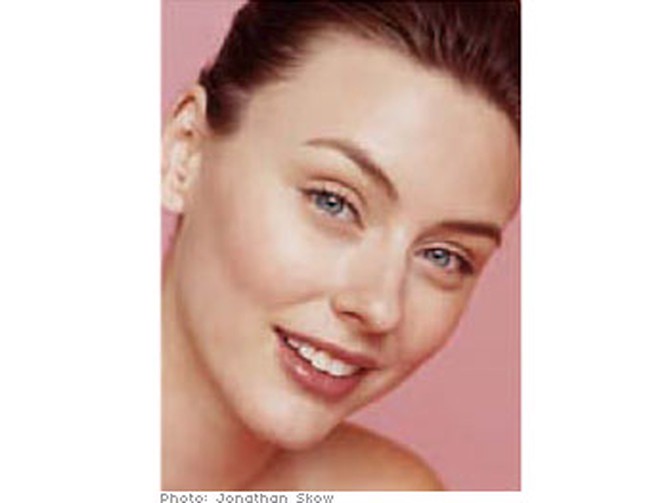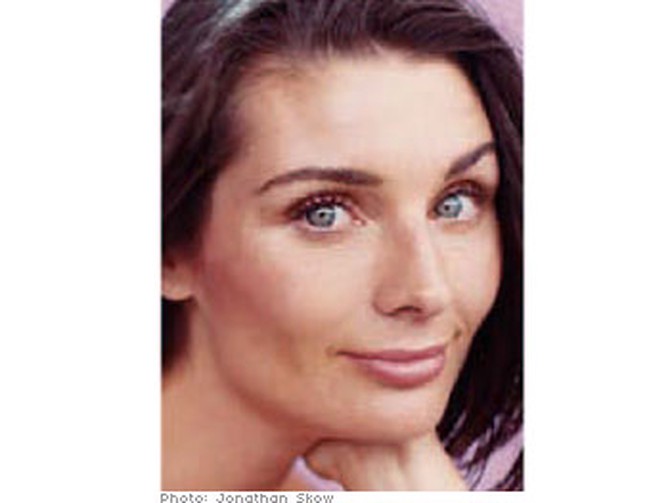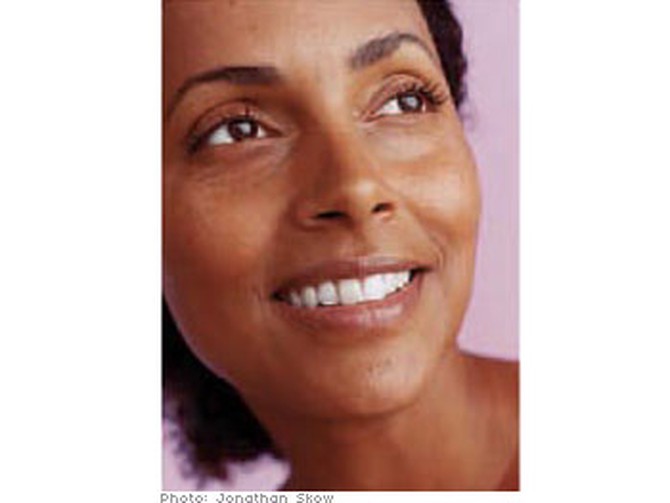Skincare by the Decade

In your 20s
"Sunbathe? Who, me?" Your skin, like your parents, highly disapproves of your rock 'n' roll lifestyle: smoking, skimping on sleep, and years of unprotected relations…with the sun. "We get 80% of our sun damage before we're 18," says David Bank, MD, a dermatologist in Mount Kisco, New York, and the author of Beautiful Skin: Every Woman's Guide to Looking Her Best at Any Age. And there's more bad news for the young and foolish who actually pay money for this damage. "By using a tanning bed, your risk of developing skin cancer can more than double over those who avoid them," says dermatologist Nicholas Perricone, MD, author of the New York Times best-seller The Wrinkle Cure. Use a noncomedogenic broad-spectrum sunscreen every day.
"Ugh, acne!" Your skin may be shifting from teenage acne to the adult variety, which means breakouts migrating to your chin and jawline or, for an unlucky few, occurring in both former (forehead, nose) and newer areas simultaneously.
"Reach for retinoids." "One of the gentler retinoid formulations, like prescription Differin, two or three nights a week will help prevent breakouts, undo some sun damage, and boost collagen production," says Bank. Use it in the evening in conjunction with a daily moisturizer that has at least an SPF 15 in the morning, and your skin will say thank you when you hit your 30s.
"Ugh, acne!" Your skin may be shifting from teenage acne to the adult variety, which means breakouts migrating to your chin and jawline or, for an unlucky few, occurring in both former (forehead, nose) and newer areas simultaneously.
"Reach for retinoids." "One of the gentler retinoid formulations, like prescription Differin, two or three nights a week will help prevent breakouts, undo some sun damage, and boost collagen production," says Bank. Use it in the evening in conjunction with a daily moisturizer that has at least an SPF 15 in the morning, and your skin will say thank you when you hit your 30s.

In your 30s
"It's time to face the music." Now you begin to confront past skin sins. "This is the decade when you wake up to things you've never noticed on your skin before," says dermatologist David Bank, MD. Sunspots, broken blood vessels and fine lines replace acne for some and accompany it for others. Acne tends to become more hormonally driven, so the week before and during your period might not be pretty. Your complexion dulls, too, since cell turnover is slowing down.
"Speed up turnover." Bump up your retinoid use to four or five nights a week to stave off wrinkles, uneven texture, and loss of elasticity. "It gives you an antiacne, antiwrinkling effect with little to no drying or irritation," says Bank. (If you have sensitive skin, try less-irritating Kinerase instead.) On nights you're not using a retinoid, smooth on a potent exfoliant like glycolic or lactic acid to speed cell turnover; if your skin can tolerate it, apply a mild at-home glycolic peel once a week.
"Mmm, antioxidants!" They boost sun protection and fight free radicals (destructive molecules that are formed when your skin comes into contact with UV rays, pollution, allergens and a host of other irritants). "The most effective include vitamin C and tocopherol [a potent form of vitamin E]," says Bank. Green tea and selenium may also be beneficial. Look for them in your moisturizers and sunscreens.
"Speed up turnover." Bump up your retinoid use to four or five nights a week to stave off wrinkles, uneven texture, and loss of elasticity. "It gives you an antiacne, antiwrinkling effect with little to no drying or irritation," says Bank. (If you have sensitive skin, try less-irritating Kinerase instead.) On nights you're not using a retinoid, smooth on a potent exfoliant like glycolic or lactic acid to speed cell turnover; if your skin can tolerate it, apply a mild at-home glycolic peel once a week.
"Mmm, antioxidants!" They boost sun protection and fight free radicals (destructive molecules that are formed when your skin comes into contact with UV rays, pollution, allergens and a host of other irritants). "The most effective include vitamin C and tocopherol [a potent form of vitamin E]," says Bank. Green tea and selenium may also be beneficial. Look for them in your moisturizers and sunscreens.

In your 40s
"Hormones are playing havoc with me." The roller coaster of fluctuating hormones can lead to breakouts and then, when estrogen levels begin to drop, dryness. Fine lines begin to deepen, hyperpigmentation increases, and your skin is getting noticeably thinner and less even in texture. You might see some sagging along your jawline—the result of the loss of elasticity and of some underlying fat.
"I miss my old resilience!" At night, step up to Renova, the most moisturizing retinoid product, or if you're prone to breakouts, try a retinoid like Avita along with an oil-free moisturizer; use it on your neck and chest, too. You should be alternating between alpha hydroxy acids and lighteners to treat hyperpigmentation; if you're using hydroquinone, you might find the need to move up to a higher concentration (4 percent instead of 2 percent, prescription strength instead of OTC). "I recommend an eye cream if the thin skin around your eyes is becoming more sensitive and irritated by your regular moisturizer," says Waldorf. Consider a moisturizer with anti-inflammatory ingredients like polyphenol and grapeseed extracts as well as other ingredients that have been shown to improve skin elasticity and resilience—like coenzyme Q10, copper peptides, DMAE, and alpha lipoic acid. If you're not seeing satisfying results from topicals, "it's a good time for laser treatments—the Vbeam to zap broken capillaries and give you a little bit of a collagen boost, the diode to eliminate large brown spots," says Bank.
"Eating well is the best revenge." "A diet high in omega-3 fatty acids and antioxidants can do more to help maintain radiance than a bagful of products," says dermatologist Nicholas Perricone, MD, who explains that the omega-3 fatty acids found in wild Alaskan salmon, avocado, flaxseeds, and spinach reduce the body's production of inflammatory compounds.
"I miss my old resilience!" At night, step up to Renova, the most moisturizing retinoid product, or if you're prone to breakouts, try a retinoid like Avita along with an oil-free moisturizer; use it on your neck and chest, too. You should be alternating between alpha hydroxy acids and lighteners to treat hyperpigmentation; if you're using hydroquinone, you might find the need to move up to a higher concentration (4 percent instead of 2 percent, prescription strength instead of OTC). "I recommend an eye cream if the thin skin around your eyes is becoming more sensitive and irritated by your regular moisturizer," says Waldorf. Consider a moisturizer with anti-inflammatory ingredients like polyphenol and grapeseed extracts as well as other ingredients that have been shown to improve skin elasticity and resilience—like coenzyme Q10, copper peptides, DMAE, and alpha lipoic acid. If you're not seeing satisfying results from topicals, "it's a good time for laser treatments—the Vbeam to zap broken capillaries and give you a little bit of a collagen boost, the diode to eliminate large brown spots," says Bank.
"Eating well is the best revenge." "A diet high in omega-3 fatty acids and antioxidants can do more to help maintain radiance than a bagful of products," says dermatologist Nicholas Perricone, MD, who explains that the omega-3 fatty acids found in wild Alaskan salmon, avocado, flaxseeds, and spinach reduce the body's production of inflammatory compounds.

In your 50s
"I need a drink." Sebum (natural oil) production is decreasing yearly. "This is when you start to see significant changes in the deeper facial structure," says Shelley Sekula-Gibbs, MD, clinical assistant professor of dermatology at Baylor College of Medicine in Houston. "You will have some collagen and even bone loss, which translates into looser skin and decreased volume—especially in the mid and lower sections of the face." Decreased oil production also means that skin is more sensitive to changes in climate or season.
"Plump me up!" Step up your regimen, including the staples from previous decades—a retinoid in an emollient base (like Renova or Avage) as well as alpha hydroxy acid exfoliators, which can be used four or five times a week now, if your skin can tolerate it. Day creams should be cocktails loaded with antioxidants (vitamins C and E) and anti-inflammatory ingredients. And upgrade to more moisturizing bases across the board. "It makes sense to switch to the most emollient forms of every skincare product—creamy cleansers as well as moisturizers," says Heidi Waldorf, MD, director of laser and cosmetic dermatology at Mount Sinai Medical Center in New York City. If you're looking for a big bang, book a trichloroacetic acid (TCA) or 70% glycolic peel. "It's a great way to get rid of fine lines, uneven skin tone, and brown spots in one treatment," says dermatologist David Bank, MD.
"Ommm." Take up yoga, meditation, or another form of effective, daily stress relief. "As we age, our bodies become less efficient at fighting the stress hormones that age us prematurely," says dermatologist Nicholas Perricone, MD. "If you stress a 20-year-old and a 50-year-old, the younger woman's cortisol level returns to normal more quickly than that of the older woman." In other words, the cumulative effects of daily living, gravity and UV damage could be offset by a regular dose of relaxation in a quiet room. At least that's what your skin would tell you.
"Plump me up!" Step up your regimen, including the staples from previous decades—a retinoid in an emollient base (like Renova or Avage) as well as alpha hydroxy acid exfoliators, which can be used four or five times a week now, if your skin can tolerate it. Day creams should be cocktails loaded with antioxidants (vitamins C and E) and anti-inflammatory ingredients. And upgrade to more moisturizing bases across the board. "It makes sense to switch to the most emollient forms of every skincare product—creamy cleansers as well as moisturizers," says Heidi Waldorf, MD, director of laser and cosmetic dermatology at Mount Sinai Medical Center in New York City. If you're looking for a big bang, book a trichloroacetic acid (TCA) or 70% glycolic peel. "It's a great way to get rid of fine lines, uneven skin tone, and brown spots in one treatment," says dermatologist David Bank, MD.
"Ommm." Take up yoga, meditation, or another form of effective, daily stress relief. "As we age, our bodies become less efficient at fighting the stress hormones that age us prematurely," says dermatologist Nicholas Perricone, MD. "If you stress a 20-year-old and a 50-year-old, the younger woman's cortisol level returns to normal more quickly than that of the older woman." In other words, the cumulative effects of daily living, gravity and UV damage could be offset by a regular dose of relaxation in a quiet room. At least that's what your skin would tell you.
From the November 2004 issue of O, The Oprah Magazine

